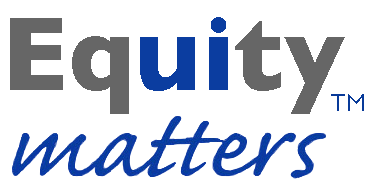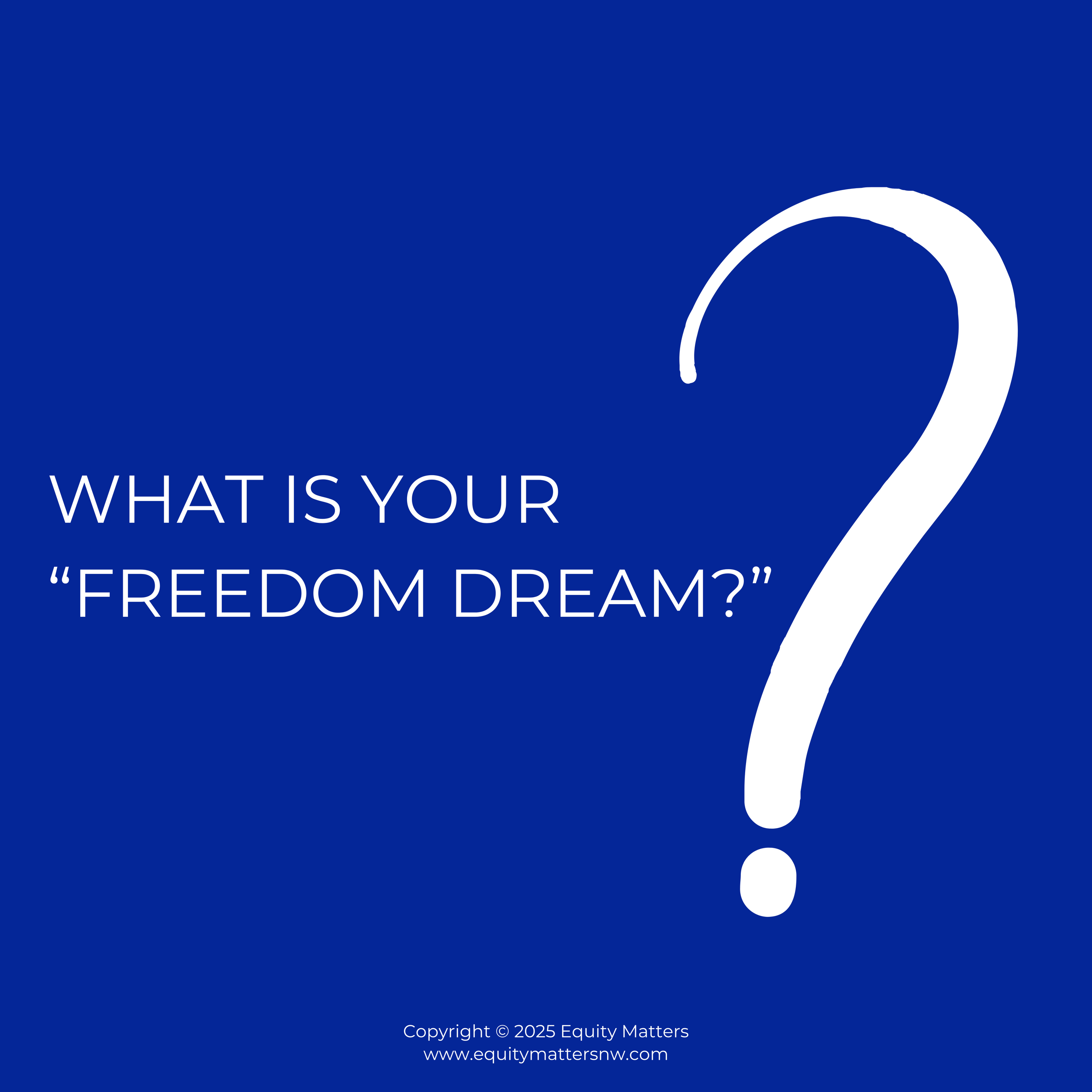What is your “freedom dream?”
Our blog is a space to explore the hard questions that move organizations toward real change. Grounded in the belief that racial equity must live in both culture and daily practice, we share stories, tools, and reflections that help bridge values with action. From internal leadership shifts to community-rooted strategies, we highlight the everyday work of building racial equity, one decision, one relationship, one breakthrough at a time.
July’s blogging prompt comes courtesy of LaToya.
As July rolls in, with fireworks, parades, and patriotic tributes, I (LaToya) find myself returning to a deeper question: What does freedom truly mean for Black, Indigenous, and communities of color?
Lately, I’ve been revisiting the work of historian and scholar Robin D.G. Kelley., particularly Kelley shares his concept of “freedom dreams.”— Freedom dreams are visions rooted in the radical imagination of BIPOC communities. In Beyond Survival: Freedom Dreams and the Radical Imagination of BIPOC Communities, Kelley reminds us that freedom isn’t just about surviving oppressive systems—it’s about imagining and building worlds where we can thrive.
What is your "freedom dream"? What would be different if it came true tomorrow?
LaToya:
I think about this often. I carry it in my bones, in the stories passed down, and in the quiet moments when I wonder what my people could have become if we had always been free.
If my freedom dream came true tomorrow, everything would feel lighter.
For me, freedom looks like Black people -– Black families, Black communities-— fully loving ourselves, without apology or fear. It looks like us being in community with one another, without competition, without comparison. We are all thriving. We are free from the shackles; those first forged in slavery that have continued to bind us through generations. And now, we are finally able to let go. We have found each other again. We hold each other again. We see one another clearly.
In my freedom dream, I, a Black woman, walk this Earth freely; able to rest without guilt, to love unconditionally, to be respected. Not merely tolerated, not managed, but seen as the gift I am. As the gift we are.
We are able to look in the mirror and see beauty. Real, radiant, ancestral beauty. And we carry that beauty into everything we do,; how we treat humankind, how we care for the Earth, how we honor the waters and the animals. We live with reverence and connection.
We would spend more energy celebrating ourselves instead of harming ourselves because of the hate we’ve internalized from those who hate us. From those who taught us that we must live with a scarcity mindset; clawing for survival, shrinking ourselves, distrusting each other. But in my dream, we know the truth: we were never meant to live in lack. We were meant to live in abundance.
What would be different if my freedom dream came true tomorrow?
The world would be different.
There would be no hate.
Black people would not be seen as a threat, but as the amazing, loving, brilliant humans we are.
We would soar.
There would be no scarcity, only abundance. Because there is no reason why we should not all have what we need, and more than enough. We have always deserved abundance. We have always deserved joy.
My freedom dream should not be a fantasy. It should be our reality.
And I believe it can be, if we keep building, together.
CiKeithia:
Watching personal freedoms being unraveled at every turn made me go to a place of sadness, despair, and fear. Honoring our collective practice of holding multiple truths, however, allowed me the space to not stray away from this feeling but it also provided me an equally powerful opportunity to see the freedom I have enjoyed past and present. This was an important reflection that I needed to name. In short, I can carry both.
My primary non-work identity is a mother and for almost 31 years. Through this idenity I have seen firsthand the results of my personal freedom. I have been able to raise, nurture, and inspire a beautiful Black man. He is safe and his basic needs are met. I had the freedom to say, “"in this home, we disrupt all racialized and gendered notions of Blackness, specifically what it means to be a Black man.”
In a recent conversation with my son, he shared that a co-worker said, "you are very confident,", and his reply was “'oOf course I am, I am my mother's child.". We As we talked for awhile and during our talk he many reflectedions on the life's lessons I've taught him. Some things I thought I knew about him, but many were new to me. I felt so good hearing this, my heart was filled with immense joy and pride. It affirmed for me that I achieved my dream of raising an amazing young man who that knows no boundaries on what he can achieve. It made me realized that even in difficult moments, I modeled for him persistence . He understands and the idea that many things can be denied but your humanity and desire for the very best in your life is not one of them.
Heidi: For my reflection, I decided to write a letter to my toddler.
Dear Rio,
I used to think freedom looked like fireworks.
I thought it was loud and bright, something to be celebrated in the streets, with flags waving and songs about liberty echoing through the air. That’s the version of freedom this country taught me, one built on declarations and myths, on silences where there should have been truth.
But now I know real freedom is quieter. It’s deeper. It lives in the choices we make when no one’s watching. It shows up in the way we care for each other, the way we refuse to be erased, and the way we keep imagining something better, even when the world tells us not to.
I’ve been thinking about you a lot this July. I think about what kind of world you’ll grow up in. And what kind of freedom I want you to know.
I want you to know the freedom Angela Davis speaks of when she says, “Freedom is a constant struggle.” That liberation isn’t a moment, it’s a lifetime of organizing, dreaming, and refusing to settle for scraps. I want you to feel the freedom Octavia Butler imagined, freedom as transformation, survival, and creation in the face of everything. I want you to hear bell hooks whispering that freedom begins with love: love of self, love of Blackness, love that disrupts domination.
And Grace Lee Boggs, she said, “These are the times to grow our souls.” I think that’s the kind of freedom I believe in now. The kind that asks us to grow, not just resist. To build. To become.
This isn’t the kind of freedom a nation can give you. It’s the kind we have to make together.
So, if someday you find yourself wondering, during a parade or a protest or a quiet night at home, what freedom really means, I hope you remember this: freedom is not just what we fight for. It’s what we live into. It’s what we pass on.
With love and possibility,
Umma 엄마

